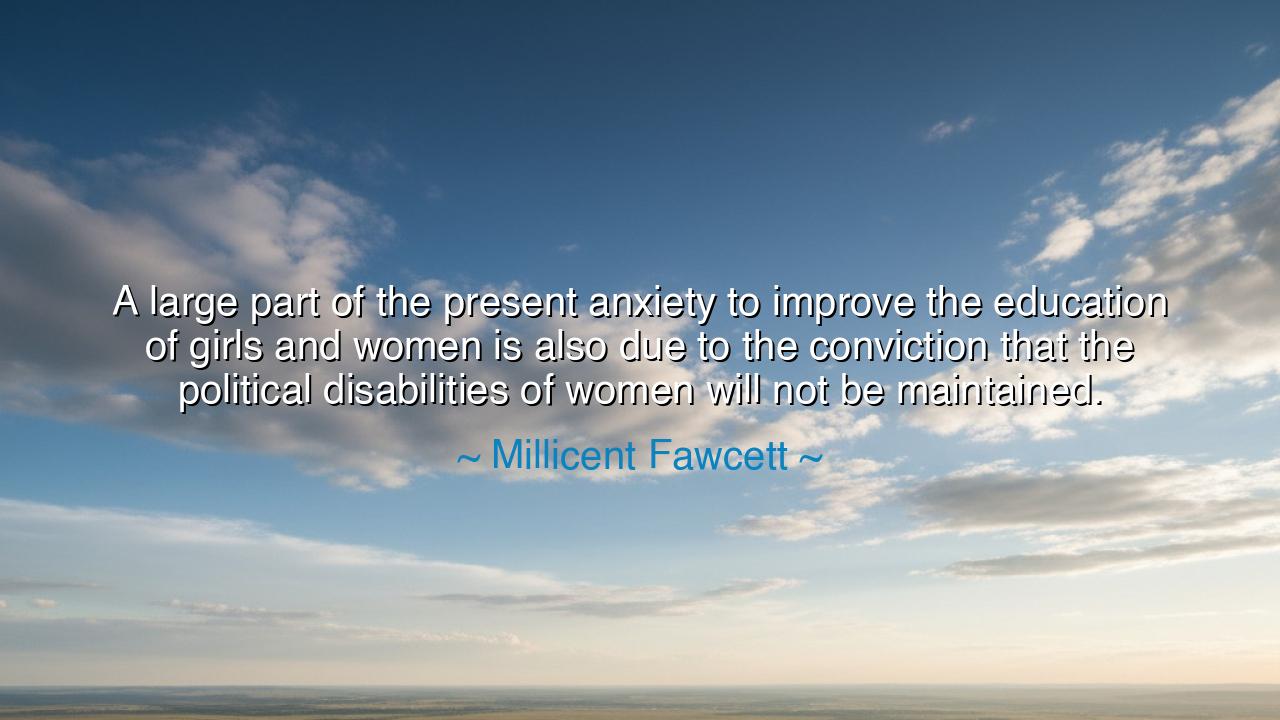
A large part of the present anxiety to improve the education of
A large part of the present anxiety to improve the education of girls and women is also due to the conviction that the political disabilities of women will not be maintained.






The noble and steadfast Millicent Fawcett, one of the great architects of women’s freedom, once proclaimed: “A large part of the present anxiety to improve the education of girls and women is also due to the conviction that the political disabilities of women will not be maintained.” These words, born of both reason and prophecy, stand as a testament to an age in transformation. Fawcett spoke not merely of classrooms and books, but of liberation itself. She saw, with the clarity of a reformer’s vision, that education and freedom are bound together—that the enlightenment of the mind must precede the emancipation of the body and the spirit.
To understand her meaning, we must journey back to the late nineteenth century, when women were denied both voice and vote. In that world, Millicent Fawcett rose as a beacon of patience and intellect amidst an age of prejudice. Unlike the fiery radicals of her time, she believed in reasoned persuasion—the steady awakening of society through education, dialogue, and reform. Her words reveal the faith that guided her: that as women became educated, the world could no longer justify their subjugation. Once the mind of woman had been trained to reason, to question, to lead, the walls of political disability would crumble of their own accord. Her statement was both observation and prophecy—the conviction that the rise of education would make inequality impossible to sustain.
In her age, women were expected to know little beyond the domestic sphere. Yet, Fawcett saw how this ignorance had been imposed, not natural. She recognized that denying education to women was the first link in the chain that bound them. To improve women’s schooling, therefore, was not a mere act of charity—it was a quiet revolution. As girls learned to read, to write, to think independently, they began to see their rightful place not as subjects, but as citizens. And as society began to educate them, it did so with a sense of unease—an “anxiety,” as she called it—because it could sense what education would inevitably bring: the end of political inequality, the dawn of justice.
The truth of Fawcett’s insight can be seen in the great story of Malala Yousafzai, a young girl who, more than a century later, faced bullets for daring to demand education. Her struggle, like Fawcett’s, was not merely for knowledge but for dignity. The oppressors who denied girls schooling did so because they feared the same truth: that education awakens power. Once the light of knowledge enters the mind, it cannot be extinguished; once the oppressed learn to think, they can no longer be enslaved. Thus, through every age and nation, the liberation of women begins with the opening of books, the breaking of ignorance, and the courage to learn.
Fawcett’s quote carries within it both wisdom and warning. She understood that education is never a neutral act—it transforms the order of the world. When women began entering universities, society trembled, for it knew what was coming. The political disabilities—the denial of the vote, the exclusion from office, the silencing of their voices—were already doomed, for no civilization can long maintain injustice against the enlightened. Knowledge, like a rising tide, erodes the foundations of tyranny. Once women stood equal in intellect, the moral and political structures of inequality could not stand.
Yet her words also speak to us now, in a new century. For though the doors of education have opened wider, there remain walls of prejudice and shadowed corners where opportunity is still denied. The anxiety to improve education persists—not as fear of rebellion, but as hope for renewal. Every child, girl or boy, who learns to think with clarity and compassion becomes a force against ignorance and injustice. And just as Fawcett foresaw, wherever the mind is liberated, the spirit will not long remain in chains.
The lesson, therefore, is clear and enduring: education is the seed of freedom, and its fruit is equality. To uplift the oppressed, one must first enlighten the mind. The pen is not merely a tool for writing; it is a weapon against tyranny. The classroom is not merely a room—it is a battlefield where ignorance meets its end. Fawcett calls to us still: invest not only in knowledge, but in understanding; not only in the intellect, but in the conscience of humankind.
So, let us honor her wisdom. Let us strive for an education that uplifts rather than excludes, that enlightens rather than subdues. Let us ensure that no one—no woman, no child—is ever again denied the right to learn, for in every mind lies the spark of transformation. As Millicent Fawcett foresaw, the destiny of justice begins in the schoolroom. For where there is education, there is freedom—and where there is freedom, there is the unbreakable promise of equality fulfilled.






AAdministratorAdministrator
Welcome, honored guests. Please leave a comment, we will respond soon